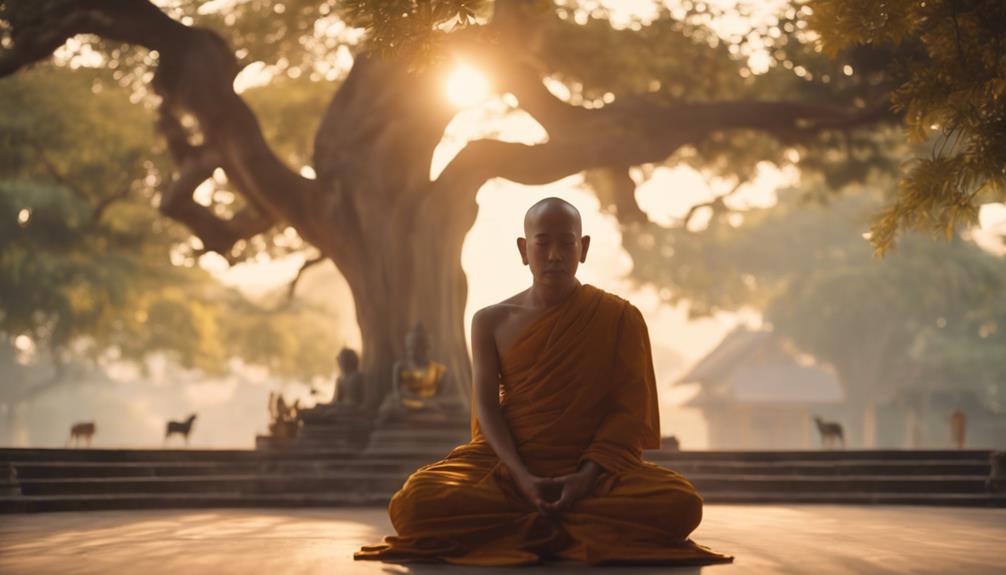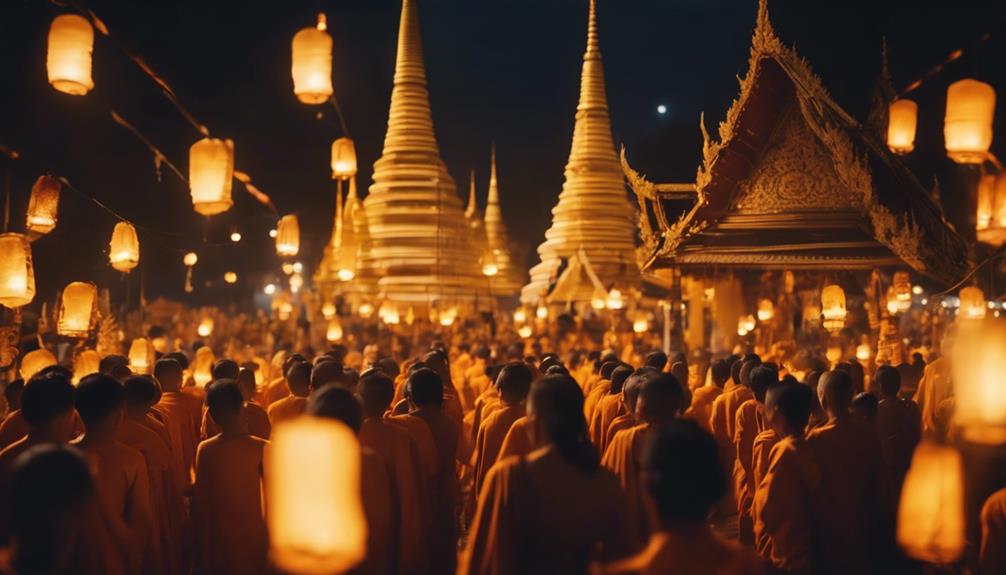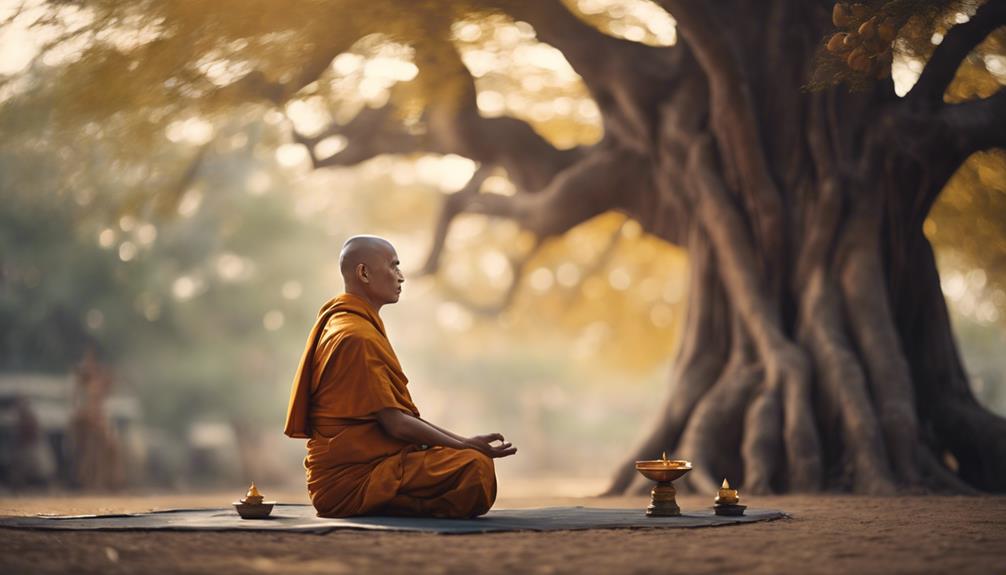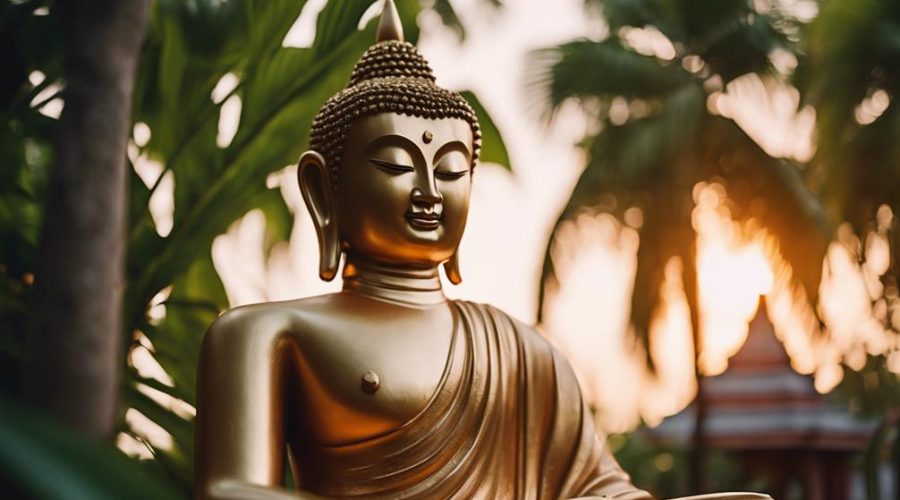Is Thailand a Spiritual Country?
Yes, Thailand is profoundly spiritual. It's deeply rooted in Buddhism, observed by approximately 95% of its citizens, and this influences almost every aspect of life, from social interactions to personal routines. Even Thai art and literature bear the traces of spiritual beliefs, with narratives often reflecting themes of Karma, ancestor worship and the unseen world. Additionally, spirituality is integral to Thai festivals, rituals and the abundant presence of temples and spirit houses throughout the country. If you were to explore further, you'd uncover an extraordinary symbiosis of culture and spirituality in the Thai lifestyle.
Key Takeaways
- Thailand is a highly spiritual country, with 95% of the population practicing Buddhism, which profoundly influences their lifestyle and worldview.
- Thai spiritual practices integrate Buddhism, Hinduism, and animism, creating a unique blend of beliefs and traditions.
- Spiritual elements are deeply entrenched in Thai culture, evident in art, architecture, social norms, and even cuisine.
- Thai spirituality places significant emphasis on karma, fostering a sense of interconnectedness, collective responsibility, and moral guidance.
- Spiritual tourism is a significant aspect of Thailand, offering meditation retreats, temple visits, and immersive experiences into Thai spiritual practices.
The Root of Thai Spirituality

To truly understand the spiritual essence of Thailand, you must explore the profound roots of its intricate belief system, deeply embedded in the country's culture, traditions, and daily life. This exploration offers a fascinating lens through which to view spiritual tourism, a rapidly growing sector fueled by global interest in the country's unique spiritual practices.
A central facet of Thai spirituality is ancestor worship, an age-old tradition that persists despite the march of modernity. This reverence for forebears isn't merely a quaint custom, but an integral part of daily life, shaping social norms and behaviors. Thais believe their ancestors' spirits remain an active part of the family, offering guidance and protection. This interaction with the spiritual domain is thought to bring prosperity and harmony, fostering a sense of continuity and connection across generations.
In essence, spiritual tourism in Thailand isn't just about visiting temples or witnessing exotic rituals. It's about immersing oneself in a culture where the spiritual and physical domains are deeply intertwined, where respect for ancestors permeates every aspect of life. It's about understanding a belief system that, while deeply traditional, continues to evolve and adapt to the demands of a changing world.
Influence of Buddhism in Thailand
You'll find that Buddhism's role in Thai society is deeply entrenched, shaping not only religious practices and traditions but also informing the culture at large.
It's not simply a religion but a way of life, a philosophy that steers the moral compass of the Thai people.
As you explore further, you'll appreciate how this spiritual path has shaped the Thai ethos, creating a unique blend of belief, tradition, and cultural expression.
Buddhism's Role in Society
Buddhism weaves into the fabric of Thai society, profoundly shaping its morals, customs, and overall worldview. The country's social structure is deeply embedded in Buddhist ethics, creating a community where compassion, mindfulness, and peace aren't just ideals, but lived realities.
Key to this is the Monastic Life. Monks are revered figures, acting as spiritual educators and moral compasses. They exemplify Buddhist principles, serving as a constant reminder of the path towards enlightenment. Their daily routines, from meditation to alms gathering, symbolize self-discipline and humility, reinforcing societal values.
Innovation, too, finds its place in this spiritual framework. Buddhism in Thailand isn't stagnant, but adaptive, actively engaging with modern issues. It's not merely a religion; it's a way of life, shaping Thai society from the grassroots up.
Religious Practices and Traditions
Examining the religious practices and traditions deeply influenced by Buddhism offers an even clearer lens into Thailand's spiritual identity. The nation's spiritual tourism industry is booming, with visitors flocking to temples and sacred sites, seeking a glimpse into the rich tapestry of Buddhist rituals and practices.
The Thais' approach to Buddhism is marked by religious syncretism; they've seamlessly integrated elements of Hinduism, animism, and other indigenous beliefs into their Buddhist practices, creating a unique spiritual landscape. This syncretism is a testament to Thailand's openness to innovation, continually reinventing its spiritual traditions while maintaining its Buddhist core.
As you navigate Thailand's religious terrain, you'll find it's more than just a spiritual country; it's a living, evolving demonstration of the power of faith and tradition.
Impact on Thai Culture
Innumerable aspects of Thai culture, from art and architecture to the social fabric, bear the profound imprint of Buddhism. You'll find that this spiritual philosophy permeates every corner of Thai life, leaving an indelible legacy that's not only visible, but also experiential.
- Look at Spiritual Tourism. This burgeoning industry shows how Thailand's Buddhist heritage draws visitors globally, seeking spiritual enlightenment and peace.
- Thai Astrology is another fascinating aspect. Rooted in Buddhism, it shapes people's decisions, celebrations, and life courses.
- Buddhism's influence on Thai art and architecture is undeniable. Temples, sculptures, paintings – all resonate with Buddhist teachings.
- Consider the social norms. Respect, tolerance, and mindfulness are cornerstones of Thai society, courtesy of Buddhism.
Role of Temples in Thai Society
Thailand's societal fabric is intricately woven with the profound influence of its temples, which serve as both spiritual sanctuaries and community centers. These temples, with their unique architecture, are not just places for religious worship, but are also hubs for community engagement.
The temple architecture reflects Thailand's cultural richness and historical evolution. You'll observe intricate designs, grand structures, and beautiful murals that narrate traditional Thai stories and depict scenes from Buddhism.
Community engagement in these temples is multifaceted. From religious ceremonies to community meals, educational activities to voluntary services, the temples nurture solidarity and foster social cohesion.
To visually represent this, consider the table below:
| Temple Architecture | Community Engagement |
|---|---|
| Reflects cultural heritage | Encourages participation |
| Presents historical narrative | Fosters cohesion |
| Symbolizes spiritual beliefs | Serves as a social hub |
| Showcases artistic talent | Promotes voluntary service |
In essence, Thai temples play an instrumental role in shaping the society's spiritual identity while encouraging community involvement. They stand as splendid indications to the nation's past, and continue to guide its future through communal harmony and spiritual enlightenment.
Thai Spiritual Festivals and Rituals

Diving deeper into the spiritual fabric of Thailand, you'll find an array of vibrant festivals and intricate rituals that further exemplify the nation's profound spirituality. As a part of spiritual tourism, you'll encounter an immersive and enlightening experience.
- Loy Krathong: This festival of lights is an enchanting spectacle where countless lanterns illuminate the night sky, symbolizing the release of negativity.
- Songkran: Known as the Thai New Year, this water festival represents purification and the washing away of sins and bad luck.
- Yi Peng: Similar to Loy Krathong, thousands of lanterns are launched into the sky, creating an ethereal spectacle of light.
- Sak Yant: This sacred tattooing ritual involves monks inscribing protective symbols and ancient mantras onto devotees' skin, using traditional methods.
These spiritual traditions provide a unique blend of cultural immersion and spiritual exploration, enriching the experience for those seeking a deeper understanding of Thai spirituality. They're not only an integral part of the local culture but also a major attraction for spiritual tourism. The ritual of Sak Yant, for instance, offers a transformative journey, blending the physical with the metaphysical. Through such practices, Thailand continues to be a beacon of spiritual enlightenment.
Animism and Spirit Houses in Thailand
Venturing beyond the popular festivals and rituals, you'll find that animism and the tradition of spirit houses are deeply ingrained in the spiritual psyche of Thailand. Animism, the belief that non-human entities possess spiritual essence, is a foundational element of Thai spirituality. This is palpable in the widespread presence of spirit houses, miniature shrines erected to appease and honor the spirits residing on the land.
These spirit houses aren't just essential cornerstones; they're vital in maintaining a harmonious relationship with nature and the unseen world. They exemplify the interplay of spiritual tourism and cultural preservation, attracting visitors keen on understanding the complexities of Thai spirituality.
Equally intriguing is the practice of ancestor worship, another facet of animism in Thailand. It's an intimate ritual, aiming to maintain familial bonds beyond the physical world. It's a demonstration of the Thai understanding of interconnectedness, transcending the boundaries of life and death, human and nature.
In essence, the practices of animism, with its spirit houses and ancestor worship, are more than traditions. They're a living demonstration of the dynamic, inclusive, and deeply spiritual nature of Thai society, contributing significantly to its spiritual tourism appeal.
The Concept of Karma in Thai Culture

In the intricate tapestry of Thai spirituality, the concept of Karma plays a pivotal role, shaping the moral compass and guiding the actions of individuals in society. This belief system isn't just about retribution; it's about ethical implications and personal responsibility.
Thailand's unique Karma interpretations can be boiled down to four key principles:
- Every action has a consequence; this isn't punishment, but rather a natural outcome. This perspective encourages mindfulness in everyday decisions.
- Karma doesn't expire. Past actions can manifest in the present or future, reinforcing the need for consistent ethical behavior.
- Karma can be mitigated. Good deeds can counterbalance negative Karma, promoting a proactive approach to life's challenges.
- Karma binds us all. Our actions impact others, fostering a sense of interconnectedness and collective responsibility.
These principles aren't just abstract concepts; they're woven into the social fabric, influencing everything from interpersonal relationships to business practices. They inspire innovative solutions to ethical dilemmas and foster a culture that values harmony, understanding, and compassion. By grasping the Thai concept of Karma, you gain not just an insight into this spiritually rich nation, but also a profound perspective on life itself.
Spirituality in Thai Art and Literature
When delving into Thailand's spirituality, it's crucial to ponder its manifestation in Thai art and literature. Thai art often employs symbolism to convey spiritual ideologies, which are frequently deeply ingrained in Buddhism.
On the flip side, literature serves as a reflection of these spiritual concepts, underscoring the widespread influence of these beliefs in all facets of Thai society.
Symbolism in Thai Art
Exploring Thai art, you'll find it's steeped in spiritual symbolism, effectively acting as a mirror that reflects the country's deep-rooted religious and philosophical beliefs. This artistic symbolism is an essential part of Thai aesthetics, and it has four key elements:
- The lotus, symbolizing purity and spiritual enlightenment.
- The naga, a mythical serpent representing protection and divine power.
- The Garuda, a bird-like creature, embodying authority and respect.
- The Bodhi tree, a symbol of Buddha's enlightenment.
These symbols don't just contribute to the visual appeal of the art. They serve as a profound spiritual narrative, encouraging you to explore further into your interpretation. This innovative approach to symbolism is what makes Thai art a unique spiritual journey.
Literature's Spiritual Reflections
Just as Thai art teems with spiritual symbolism, so too does its literature, offering a nuanced tapestry of philosophical insights and religious devotion.
You'll discover spiritual symbolism deeply embedded in Thai narratives, often presented through mystical folklore. These tales serve as a conduit, transmitting spiritual wisdom and reflections on the metaphysical domain.
A profound exploration of this literature reveals an intricate layering of spiritual allegory, intertwined with the cultural and social tapestry of Thailand. Thai authors adeptly fuse ancient wisdom with contemporary storytelling, creating a vibrant literary landscape that resonates with spiritual resonance.
This ingenious integration of spiritual elements in Thai literature not only enriches the narrative but also invites you, the reader, to engage in an introspective journey, challenging your perceptions of spirituality.
Influence of Buddhism
Undeniably, the pervasive influence of Buddhism in Thailand permeates its art and literature, imbuing each with profound spiritual undertones. It's a blend of tradition and innovation, reflecting the society's deep-rooted spirituality.
Buddhist vegetarianism is vividly depicted in art and literature, promoting a lifestyle of compassion and non-violence.
Mindful meditation, a cornerstone of Buddhism, is regularly featured, fostering an ethos of introspection and self-discovery.
The intricate temple art, often depicting Buddha's life and teachings, serves as an artistic guide for moral and ethical living.
Thai literature, rich with Buddhist symbolism, inspires readers to seek enlightenment and inner peace.
This blend of art, literature, and spirituality creates a unique cultural tapestry, reflecting the innate spirituality of Thailand.
Impact of Spirituality on Thai Lifestyle
The profound influence of spirituality on the daily lives of Thais, from their social interactions to their personal routines, is an integral aspect of understanding Thai culture. You'll find this influence manifesting in various ways, but most prominently in the domains of spiritual cuisine and meditation practices.
| Spiritual Cuisine | Meditation Practices |
|---|---|
| Emphasizes mindfulness in preparation and consumption | A daily routine for many Thais |
| Food offerings to monks and spirits symbolize merit-making | Promotes emotional well-being and peace of mind |
| Vegetarian meals during religious festivals show restraint | Meditation retreats offer immersive spiritual experiences |
| Buddhist principles influence ethical eating habits | Practiced in temples, nature, or even at home |
Influential is the role of spiritual cuisine; food is prepared and consumed mindfully, often with offerings made to monks and spirits. Ethical eating, inspired by Buddhist principles, is also widely observed. Vegetarian meals during religious festivals, for instance, signify self-restraint and respect for all life forms.
Meditation practices, on the other hand, are part and parcel of the Thai lifestyle. It's not uncommon to find Thais meditating at temples, in nature, or even at home, as a way to promote emotional well-being. Immersive meditation retreats also offer transformative experiences for those seeking deeper spiritual insights.



